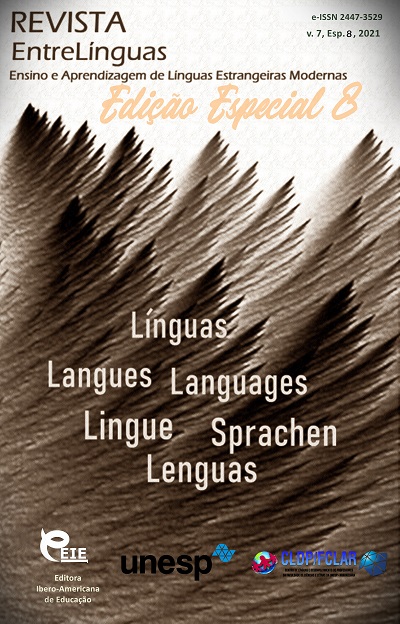Tools for creating a corpus of dictionaries and an instrument for documenting low-resource languages
DOI:
https://doi.org/10.29051/el.v7iesp.8.16360Keywords:
Low-resource languages, Russian loanwords, Paradigm, Caucasian (Nakh-Dagestan) languages, Contextual synonymy, Historical lexicology, BibleismsAbstract
The article discusses the concept of creating a corpus of dictionaries and ways to document low-resource languages. Translation of a classic work of world literature is always an important milestone in the development of national culture. Such translations attest to the maturity of small languages, and raise their prestige among the languages of the world. This aspect of the description of bibleisms in the system of small languages of Russia is ordered in the paradigm of contextual synonymy. Although much work has been done in recent years in the study of Caucasian biblical studies and contextual synonymy has been systematized, taking into account their translation, many terms of the classical work have not been sufficiently studied. The concept of translating Biblical texts in the Caucasian languages allows us to understand the linguistic problems of creating a corpus of dictionaries and a means of documenting low-resource languages.
Downloads
References
ABDULLAYEV, I.H. Interdagestan and Intercaucasian language contacts. Makhachkala: Aleph, 2015. 614 p.
ARNOLD, I.V. Semantics. stylistics. Intertextuality. M., 2013. 320 p.
Blythe R. Translation problems. St. Petersburg: LLI, 1995. V.V. Selected Works. Research on Russian grammar. M., 1975. P. 4 - 9.
Efendiev, I.I. Iranisms in the Lezgi language. Makhachkala, 2000.
HUMBOLDT, W. On the difference between the structure of human languages and its impact on the spiritual development of mankind // Selected works on linguistics. M.: Progress, 1984. P. 24 - 26.
MUTALOV, R.O., YUSUPOV, KH.A. Educational resources of the Dargin language: electronic dictionary // Educational technologies and society. T.20, No. 2. 2017. P 310-322.
POLAJKOV, N. Anglo-Russian dictionary of biblical terms and Christian phrases. United States, 1994. P. 12-15.
SHIKHALIEVA, S. Semantic Conflict Of The Caucasian Languages And Scenarios For The Development Of Scientific Research // ALRJournal. 2021; 5(4): 201-204 [https://www.alrjournal.com/jvi.aspx?un=ALRJ-90022&volume=5&issue=4]
SHIKHALIEVA, S. The Strategy of Language Corpus Development as a Linguistic Competence of the User of Flex Program. Аmazonia-investiga. Vol 8 No 21 (2019) Р.187-191 [https://amazoniainvestiga.info/index.php/amazonia/article/view/89]
Text: aspects of study: poetics, pragmatism, semantics // Articles. M., 2001. 320 p.
VINOGRADOV, O.I., KLIMOV, G.A. On Armenisms in Dagestan languages // Etymology. 1977. M., 1979. P. 154-159.
КIEVA, Z. Lexicology and phraseology of the Ingush language. Маgаs, 2017. p. 234
КRАSNIH, V. Ethnopsyholingvistism and linguist culture. M., 2002. p. 214
Downloads
Published
How to Cite
Issue
Section
License

This work is licensed under a Creative Commons Attribution-NonCommercial-ShareAlike 4.0 International License.
Os manuscritos aceitos e publicados são de propriedade da Revista EntreLínguas. Os artigos publicados e as referências citadas na Revista EntreLínguas são de inteira responsabilidade de seus autores.
Transferência de direitos autorais – autorização para publicação
Caso o artigo submetido seja aprovado para publicação, já fica acordado que o(s) autor(es) autoriza(m) a UNESP a reproduzi-lo e publicá-lo na EntreLínguas, entendendo-se os termos “reprodução” e “publicação” conforme definição respectivamente dos incisos VI e I do artigo 5° da Lei 9610/98. O artigo poderá ser acessado pela rede mundial de computadores (Internet), sendo permitidas, a título gratuito, a consulta e a reprodução de exemplar do artigo para uso próprio de quem a consulta, desde que haja a citação ao texto consultado. Essa autorização de publicação 328 EntreLínguas, Araraquara, v. 1, n .2, p. 323-328, jul./dez. 2015 não tem limitação de tempo, ficando a UNESP responsável pela manutenção da identificação do(s) autor(es) do artigo. Os artigos publicados e as referências citadas na Revista EntreLínguas são de inteira responsabilidade de seus autores.











